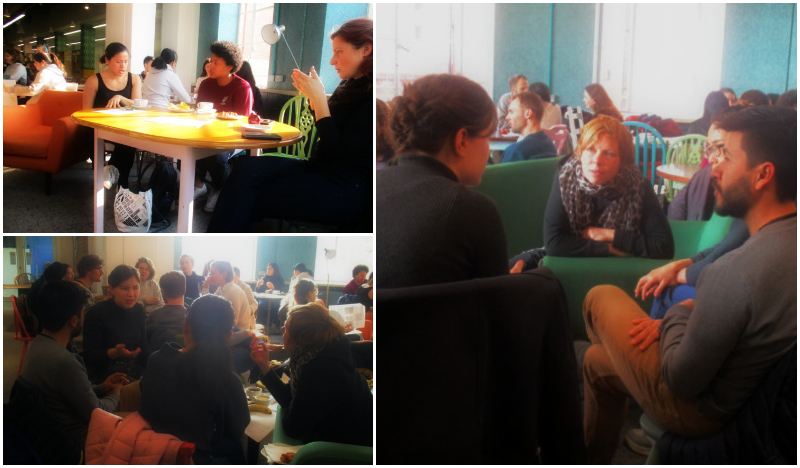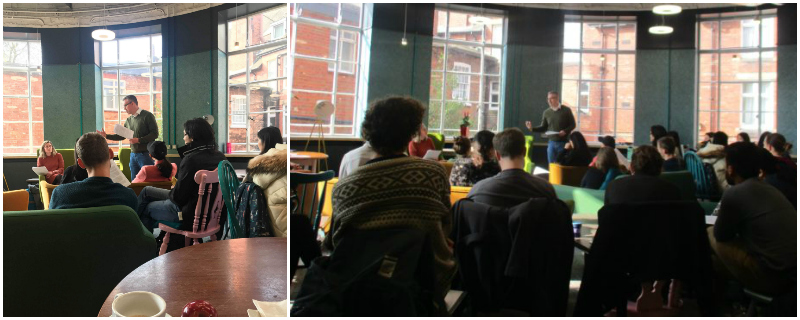Postgraduate Breakfast Club
The event took place at the Common Ground, which is a lovely area for sharing minds. The organiser invited two speakers from the School of English – Professor David Higgins and his PhD tutee Lucy Rowland, who are currently doing research within the Environmental Humanities. They led us to consider the connections between climate change and power relations in Romantic-period literature and contemporary speculative fiction.
Looking for things to do during the Easter break in school, this postgraduate breakfast club caught my eyes. This year’s theme is Climate Change, which is a hot topic that a lot of people concern about. I am quite curious how guest speakers will extend this social responsibility issue into arts, ethics and literature. What’s more, I can’t say no to free breakfast and coffee. - Leyao
Every time I attend any event organized by the University or the Union, I always feel overwhelmed by how everyday our community of researchers, staff members and students contribute their innovative work towards the world of progression. Whilst enjoying some delicious breakfast and amazing sunshine through the window, I joined a discussion over one of the most important topics i.e. ‘Environmental humanities’ in order to consider the connections between the climate change and power relations in romantic-period literature and contemporary speculative fiction. - Anam

The whole process was divided in three sections: topic introduction, individual discussion, guess speeches and Q&A. People took full participation during the event and showed high interests. Every table seemed to have a hit discussion, people were passionate to share their minds, and the girl sat next to me took a page of notes.
Honestly, I didn’t catch up much about the speeches as what they talked about was far beyond my cognitive, but students from the same table helped explain it and I started to understand some core information they tried to deliver. Overall, it was a mind-opening event to take part in on a sunny refreshing morning, getting to know new people and learn new knowledge. - Leyao
The main focus of this session was particularly on the question of who gets to tell stories of climate change, as well as how it produces and is produced by, inequalities related to gender, race and class. This session was conducted by the two highly qualified guest speakers. One of them was Dr. David Higgins who is the Associate Professor in English Literature and whose colossal research work has been related to the British Romanticism; constructions of the self; nationalism and imperialism; literary ecologies; environmental humanities; culture and climate change; Eco theory. The other amazing guest speaker was Miss. Lucy Rowland who is a current PhD student who has worked for "Tortured Ecologies": Environmental Disaster and Climate Discourse in Contemporary Women's Speculative Fiction.

First of all, Dr. David, with reference to his book ‘British Romanticism, Climate change and Anthropocene’ spoke about the first major eco-critical study of the relationship between British Romanticism and the climate change. He discussed about how romantic texts affirm the human capacity to shape and make sense of a World with which we are profoundly entangled and the same time represent our humiliation by powerful elemental forces that we do not fully comprehend. Dr. David emphasized on the consequences of the current issue in environmental humanities i.e. Tambora crisis which refers to the Mount Tambora, or Tomboro, which is currently an active, violent and extra-ordinary eruption in the northern part of Sumbawa, one of the Lesser Sunda Islands of Indonesia. It is a wretched delusion attempted upon the people to tell them that Parliament can furnish a remedy for their distresses. It is recommending them to make no effort, to take no though for themselves but to give credit to such monstrous assertion the Parliament can change the course of nature and of the seasons-convert, by a simple resolution.

The other half of the session was conducted by Miss. Lucy Rowland who spoke about her current contribution towards the contemporary women’s speculative fiction and discourses of climate change. By referring to her thesis work, she stated that ‘discourse’ denotes to identifiable, specific narrative framings of climate change, global warming, environmental change that occurs within the novels. It is a shared meaning of a phenomenon that can be reproduced, adhered to and modified through written and oral statements. Also, she points out a theoretical standpoint that builds on ecofeminism, which seeks to emphasize on the structural homologies between patriarchy, capitalism, racism and techno-science, each of which depends on enforcing hierarchical dualism between dominant and oppressed entities often of the behalf of mutual liberation of women and nature. She also referred to two amazing examples of Golf Fame Citrus and the Swan Book in order to explain her motivation to work on the relation between the women and climate change.
Overall it was a wonderful experience to have a discussion with other post graduates over this breakfast and listen to some useful information from our guest speakers, about a topic that was not ever known before. to me. I felt very glad to be a part of this discussion because in our busy lives, we somehow ignore a number of things that have a huge significance in our lives. Also, I was very happy to witness that my University is putting efforts every single day to the competitive World of research and this is why Leeds University is one of the research intensive Universities in the UK. I am looking forward to attend more of sessions like this in the near future. - Anam
The Breakfast Club seminar series is for postgraduates only and will take place monthly throughout the year, the next one will be on 9th May, and students can sign up online for an excellent opportunity to exchange ideas with free breakfast!
